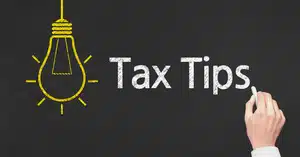Looking for tax tips? Doing your taxes can feel like a hassle if you do them yourself or an annoying expense if you pay a professional. However, tax time is when property investors can ensure they make the most of valuable deductions and benefits.
Read on for tax tips sourced from New Zealand’s IRD and local experts. Note that the information provided is not tax advice; for expert tax advice, contact a certified accountant.

Protect Against Tax Scams
Tax scams are most common around EOFY. Always verify the legitimacy of any communication claiming to be from the IRD, and never share personal information if you are suspicious of a link or message.
Find out if you can claim your interest on your mortgage
Interest on loans used to purchase investment properties is at least partly tax-deductible. Qualifying residential properties purchased before March 27, 2021, can have 50% of interest costs deducted for the financial year 23/24. This will increase to 80% for all qualifying established properties for the financial year 24/25 and then to 100% from April 2025. For new builds, full deductibility continues to apply.

Organise your records
Your income and expenses need to be correctly identified and organised. This will then allow you to ensure you are claiming all eligible deductions. Check that you have the appropriate proof of these expenses, as accurate record-keeping is essential to support these claims.
Visit the IRD record-keeping webpage for information on what records to keep and how long.
Understand which property investment expenses are tax-deductible
- Repairs and maintenance: You can claim the costs incurred to repair and maintain your rental property. Note that only repairs and maintenance qualify, not improvements or renovations.
- Property management fees: Payments to property managers for their services are deductible.
- Insurance: Landlord insurance and other property-related insurance premiums are eligible for deductions.
- Property rates: Local council rates are deductible.
- Loan interest payments: You may be eligible to claim your loan interest in part or full; see the section on the topic above.
- Principal loan payments: Any principal loan payments are not tax deductible.
The IRD provides detailed guidance on deductible expenses; use this guidance to ensure you are claiming everything that is tax-deductible and nothing that is not.

Keep Track of Capital Gains
If you sold a property during the financial year, you need to consider any capital gains tax (CGT) implications. While New Zealand does not have a comprehensive CGT, the bright-line test requires investors to pay tax on gains from properties sold within a certain period. The IRD’s bright-line test guide lays out when capital gain tax applies.
Understand what aspects of a rental property you can depreciate
While you can’t depreciate your residential buildings, you can claim depreciation on chattels and fit-outs within the property. Items like carpets, appliances, and furniture can be depreciated over their useful lives. Ensure you have a detailed depreciation schedule to support your claims. The IRD’s depreciation guide offers comprehensive information on calculating and claiming these deductions.

Seek Professional Advice
If just glancing at the depreciation guidelines leaves your head spinning, you’re not alone. Tax laws are complex and can change. Therefore, professional advice is invaluable. Engage a qualified accountant who specialises in property investments. They can:
- Provide tailored advice
- Ensure compliance with all regulations
- Maximise your tax benefits
- Review your ownership structure to optimise your tax position
If you need help finding a great accountant, contact us; we will connect you with one of our trusted partners.
